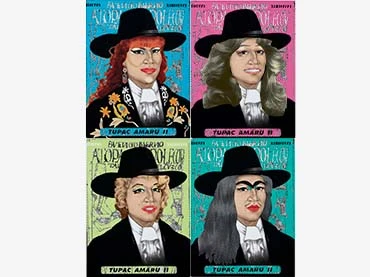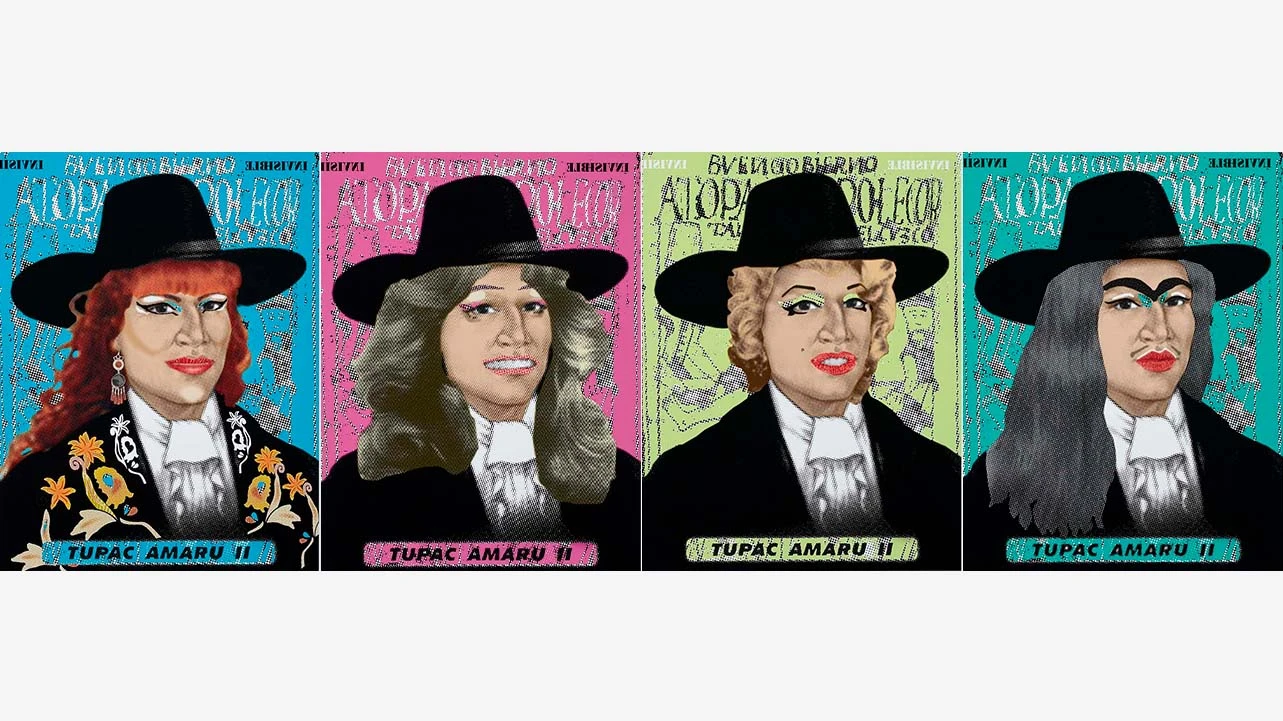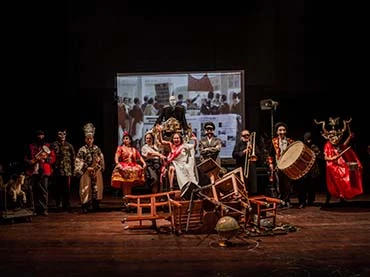-
Thursday, 23 June 2022 Nouvel Building, Protocol Room and online platform
Session 1
Tickets6pm
Feminisms in Plural
SeminarA dialogue on the definition of feminism and its contemporary ramifications with pre-eminent figures working on trans identity in Spain.
Participants: Marina Echebarría Sáenz, Rosa María García and Rita Segato
Moderated by: Elisa Fuenzalida -
Friday, 24 June 2022 Nouvel Building, Protocol Room and online platform
Session 2
Tickets11am
Action and Collection. For Theatre with a Decolonial Perspective
A Conversation Between Teresa Ralli and Rita SegatoThis encounter prompts a dialogue between this year’s Expanded Theatricalities and the Aníbal Quijano Chair programmes, welcoming a conversation between Teresa Ralli, the founder of Yuyachkani, and Argentinian anthropologist and feminist Rita Segato, director of the latter Chair mentioned.
Participants: Teresa Ralli and Rita Segato
Moderated by: Elisa Fuenzalida -
Saturday, 25 June 2022 Nouvel Building, Auditorium 200 and online platform
Session 3
Tickets6pm
In Search of a Female Episteme
A Lecture by Rita SegatoStarting from a short summary of the Chair’s subject matter in the 2021 edition — around a Left that is still aligned towards a right-wing epistome — this lecture explores the idea of “episteme” used by Aníbal Quijano and attempts to describe the patriarchal atmosphere we live in. As a result, the following question surfaces: What would a world not rooted in these same beliefs, principles, projects and ends look like?
-
Wednesday, 22, Friday, 24 and Saturday, 25 June 2022 Nouvel Building, Auditoriums, Lobby
Representation and Crisis
Audiovisual material show
A selection of audiovisual material from different time periods and interventions in the career of Grupo Cultural Yuyachkani
The Aníbal Quijano Chair
Is Feminism with Patriarchal Episteme Possible?

Held on 22, 23, 24, 25 Jun 2022
The Aníbal Quijano Chair is a space of thought that pays homage to the memory of the great Peruvian thinker, a critic of the coloniality of power, and aims to open a channel of collective reflection-action, incorporating it into the multiple viewpoints that today find colonial modernity stripped of its primeval promises.
This fourth edition, concerning the relationship between coloniality and gender, pivots on the following question: Is feminism with patriarchal episteme possible? This question draws inspiration from Aníbal Quijano’s celebrated utterance: “Is a Left with right-wing episteme possible?”, the theme running centrally through the 2021 edition. On this occasion, the reflection is aligned towards certain feminist approaches which manifest a posture of moral, inquisitorial, authoritarian, controlling, monopoly-based, expurgatory, purist and exclusivist superiority, characteristics of the patriarchal episteme we seek to leave behind. “Tomorrow’s woman should not be the man we are leaving behind” is the phrase Rita Segato perplexingly heard uttered by a National Police chief in El Salvador and which prompted her to reflect on these questions.
The programme starts with a seminar in which, with Segato and Elisa Fuenzalida — the director and coordinator of the Chair, respectively — local transfeminist activists participate. It continues with a conversation between Rita Segato and Teresa Ralli, founder and member of Grupo Cultural Yuyachkani, to set up a dialogue with the Expanded Theatricalities Chair, and ends with a public lecture by Segato.
[dropdown]
Marina Echebarría Sáenz is a professor of Mercantile Law at the University of Valladolid and a well-known LGTBIQ+ activist, specifically in the struggle for trans people’s rights. She is a professor and researcher at the University of Valladolid, where she also became vice-dean and director of the Mercantile Law Department. She is currently part of the Equality Union at the same university. Furthermore, she has been vice-president of Fundación Triángulo and participated in the process to draft Law 3/2007, of 15 March, regulating the registral rectification of the mention of people’s sex, and the drafting of different regional laws aimed at trans people. She currently chairs the Participation Council for Lesbian, Gay, Bisexual, Trans and Intersexual People (LGTBI), under Spain’s Ministry of Equality.
Elisa Fuenzalida (Lima, Peru) is a researcher, writer and activist with an MA in Advanced Studies in Social and Cultural Anthropology from the Complutense University of Madrid. Her practice sits at the crossroads between the field of gender, memory, migration, eco-territoriality and decolonial studies. She has directed research projects like El futuro era tu cuerpo, Ensamblajes del Cuidado and Afectos en re-existencia, and currently contributes to the magazine Arts of the Working Class and is a mediator on the Redes por el clima (Networks for Climate) citizen laboratory platform.
Rosa María García is an independent researcher and translator. She holds a degree in Philosophy and an MA in Applied Sociology from the University of Murcia and is currently studying her PhD in Philosophy and Gender at Universitat Jaume I. Moreover, she has translated the books Whipping Girl. El sexismo y la demonización de la feminidad desde el punto de vista de una mujer trans, by Julia Serano (Ménades, 2020), and Trans. Un alegato por un mundo más justo y más libre, by Shon Faye (Blackie Books, 2022). Notable among her latest contributions are “Migration, Gender and Sex Work: A Complex Perspective”, an article published in No. 38 of Asparkía. Investigació Feminista.
Teresa Ralli is a founder and member of Grupo Cultural Yuyachkani, where she has co-directed La Primera Cena y Cambio de Hora (The First Supper and Clock Change), and works as an administrator and has overall responsibility for its archive and documentation. As an actress-artist, she participates in the conception and mise en scène of Yuyachkani’s collective shows and pedagogical events. She was honoured with the 2011 Lima Warmi Award from Lima City Hall in recognition of her cultural and teaching work, and for her contribution to the country’s standing and development, and, with Miguel Rubio, received the Senior Fellows distinction from the Hemispheric Institute of Performance and Politics at New York University (NYU). She was the organiser of the Theatre-Women Encounters held in the Casa de Yuyachkani over a ten-year period. Moreover, she holds a baccalaureate in Communications and a degree in Performing Arts from the Pontificia Universidad Católica del Perú, where she has lectured since 1998, primarily exploring the body and the voice on her courses.
Rita Segato is a professor of Anthropology and Bioethics in the UNESCO Chair at the University of Brasilia. She was an expert witness on the trials of the Sepur Zarco case in Guatemala, where sexual violence was first tried and prosecuted, in the form of domestic and sexual slavery, as a war strategy used by the State. Her main fields of interest include new forms of violence against women and the contemporary consequences of the coloniality of power. Her most important works include: La Nación y sus Otros: raza, etnicidad y diversidad religiosa en tiempos de políticas de la identidad (Prometeo Libros, 2007) and La crítica de la colonialidad en ocho ensayos y una antropología por demanda (Prometeo Libros, 2015).
[/dropdown]
Comisariado
Elisa Fuenzalida y Rita Segato
Organiza
Museo Reina Sofía
Programa
En el marco de
Certificado de asistencia
Se emitirá un certificado de asistencia a aquellas personas que lo soliciten, mediante correo a centrodeestudios@museoreinasofia.es, especificando en el asunto “Certificado” antes del 20 de junio
Participants


Más actividades
![Tracey Rose, The Black Sun Black Star and Moon [La luna estrella negro y negro sol], 2014.](https://recursos.museoreinasofia.es/styles/small_landscape/public/Obra/AD07091_2.jpg.webp)
On Black Study: Towards a Black Poethics of Contamination
Monday 27, Tuesday 28 and Wednesday 29 of April, 2026 – 16:00 h
The seminar On Black Study: Towards a Black Poethics of Contamination proposes Black Study as a critical and methodological practice that has emerged in and against racial capitalism, colonial modernity and institutional capture. Framed through what the invited researcher and practitioner Ishy Pryce-Parchment terms a Black poethics of contamination, the seminar considers what it might mean to think Blackness (and therefore Black Study) as contagious, diffuse and spreadable matter. To do so, it enacts a constellation of diasporic methodologies and black aesthetic practices that harbor “contamination” -ideas that travel through texts, geographies, bodies and histories- as a method and as a condition.
If Blackness enters Western modernity from the position of the Middle Passage and its afterlives, it also names a condition from which alternative modes of being, knowing and relating are continually forged. From within this errant boundarylessness, Black creative-intellectual practice unfolds as what might be called a history of touches: transmissions, residues and socialities that unsettle the fantasy of pure or self-contained knowledge.
Situated within Black radical aesthetics, Black feminist theory and diasporic poetics, the seminar traces a genealogy of Black Study not as an object of analysis but as methodological propositions that continue to shape contemporary aesthetic and political life. Against mastery as the horizon of study, the group shifts attention from what we know to how we know. It foregrounds creative Black methodological practices—fahima ife’s anindex (via Fred Moten), Katherine McKittrick’s expansive use of the footnote, citation as relational and loving labour, the aesthetics of Black miscellanea, and Christina Sharpe’s practices of annotation—as procedures that disorganise dominant regimes of knowledge. In this sense, Black Study is approached not as a discrete academic field but as a feel for knowing and knowledge: a constellation of insurgent practices—reading, gathering, listening, annotating, refusing, world-making—that operate both within and beyond the university.
The study sessions propose to experiment with form in order to embrace how ‘black people have always used interdisciplinary methodologies to explain, explore, and story the world.’ Through engagements with thinkers and practitioners such as Katherine McKittrick, C.L.R. James, Sylvia Wynter, Christina Sharpe, Fred Moten, Tina Campt, Hilton Als, John Akomfrah, fahima ife and Dionne Brand, we ask: What might it mean to study together, incompletely and without recourse to individuation? How might aesthetic practice function as a poethical intervention in the ongoing work of what Sylvia Wynter calls the practice of doing humanness?

Intergenerationality
Thursday, 9 April 2026 – 5:30pm
This series is organised by equipoMotor, a group of teenagers, young people and older people who have participated in the Museo Reina Sofía’s previous community education projects, and is structured around four themed blocks that pivot on the monstrous.
The third session gazes at film as a place from which to dismantle the idea of one sole history and one sole time. From a decolonial and queer perspective, it explores films which break the straight line of past-present-future, which mix memories, slow progress and leave space for rhythms which customarily make no room for official accounts. Here the images open cracks through which bodies, voices and affects appear, disrupting archive and questioning who narrates, and from where and for whom. The proposal is at once simple and ambitious: use film to imagine other modes of remembering, belonging and projecting futures we have not yet been able to live.

Remedios Zafra
Thursday March 19, 2026 - 19:00 h
The José Luis Brea Chair, dedicated to reflecting on the image and the epistemology of visuality in contemporary culture, opens its program with an inaugural lecture by essayist and thinker Remedios Zafra.
“That the contemporary antifeminist upsurge is constructed as an anti-intellectual drive is no coincidence; the two feed into one another. To advance a reactionary discourse that defends inequality, it is necessary to challenge gender studies and gender-equality policies, but also to devalue the very foundations of knowledge in which these have been most intensely developed over recent decades—while also undermining their institutional support: universities, art and research centers, and academic culture.
Feminism has been deeply linked to the affirmation of the most committed humanist thought. Periods of enlightenment and moments of transition toward more just social forms—sustained by education—have been when feminist demands have emerged most strongly. Awareness and achievements in equality increase when education plays a leading social role; thus, devaluing intellectual work also contributes to harming feminism, and vice versa, insofar as the bond between knowledge and feminism is not only conceptual and historical, but also intimate and political.
Today, antifeminism is used globally as the symbolic adhesive of far-right movements, in parallel with the devaluation of forms of knowledge emerging from the university and from science—mistreated by hoaxes and disinformation on social networks and through the spectacularization of life mediated by screens. These are consequences bound up with the primacy of a scopic value that for some time has been denigrating thought and positioning what is most seen as what is most valuable within the normalized mediation of technology. This inertia coexists with techno-libertarian proclamations that reactivate a patriarchy that uses the resentment of many men as a seductive and cohesive force to preserve and inflame privileges in the new world as techno-scenario.
This lecture will address this epochal context, delving into the synchronicity of these upsurges through an additional parallel between forms of patriarchal domination and techno-labor domination. A parallel in which feminism and intellectual work are both being harmed, while also sending signals that in both lie emancipatory responses to today’s reactionary turns and the neutralization of critique. This consonance would also speak to how the perverse patriarchal basis that turns women into sustainers of their own subordination finds its equivalent in the encouraged self-exploitation of cultural workers; in the legitimation of affective capital and symbolic capital as sufficient forms of payment; in the blurring of boundaries between life and work and in domestic isolation; or in the pressure to please and comply as an extended patriarchal form—today linked to the feigned enthusiasm of precarious workers, but also to technological adulation. In response to possible resistance and intellectual action, patriarchy has associated feminists with a future foretold as unhappy for them, equating “thought and consciousness” with unhappiness—where these have in fact been (and continue to be) levers of autonomy and emancipation.”
— Remedios Zafra

ARCO2045. The Future, for Now
Saturday 7, March 2026 - 9:30pm
The future, its unstable and subjective nature, and its possible scenarios are the conceptual focus of ARCOmadrid 2026. A vision of the future linked to recent memory, a flash of insight into a double-edged sword. This year's edition, as in the previous two, will once again hold its closing party at the Reina Sofia Museum. This time, the star of the show is Carles Congost (Olot, Girona, 1970), one of the artists featured in the new presentation of the Collections recently inaugurated on the 4th floor of the Sabatini Building.
Carles Congost, with his ironic and timeless gaze, is responsible for setting the tone for this imperfect future, with a DJ session accompanied by some of his works in the Cloister on the first floor of the Sabatini Building of the Museo on the night of Saturday 7 March.

27th Contemporary Art Conservation Conference
Wednesday, 4, and Thursday, 5 March 2026
The 27th Contemporary Art Conservation Conference, organised by the Museo Reina Sofía’s Department of Conservation and Restoration, with the sponsorship of the Mapfre Foundation, is held on 4 and 5 March 2026. This international encounter sets out to share and debate experience and research, open new channels of study and reflect on conservation and the professional practice of restorers.
This edition will be held with in-person and online attendance formats, occurring simultaneously, via twenty-minute interventions followed by a five-minute Q&A.
